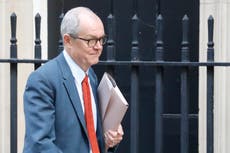Coronavirus: Government promises to hold votes ‘wherever possible’ on nationwide measures after Tory rebellion
‘I can confirm that for significant national measures with affecting the whole of England or UK-wide we will consult parliament,’ says health secretary
Matt Hancock has unveiled a government concession giving MPs a say in future “significant national measures” to tackle the coronavirus pandemic, including holding votes wherever possible.
In response to mounting frustration over the introduction of new Covid-19 rules and a lack of parliamentary oversight, the health secretary said he had listened to concerns raised by dozens of backbench Conservatives, who had threatened a rebellion.
His comments followed the dramatic intervention from Sir Lindsay Hoyle, the Commons speaker, who rebuked Boris Johnson’s government for treating parliament with “contempt” and pushing through sweeping restrictions in a “totally unsatisfactory” way.
During a press conference at Downing Street on Wednesday evening, the prime minister also warned he would “not hesitate” to impose further national restrictions if the evidence from scientific advisers required it.
Opening a debate on the Coronavirus Act, which provides ministers with the powers to enact draconian measures, Mr Hancock attempted to alleviate MPs’ concerns, telling them: “I believe in the sovereignty of parliament – and I believe in the wisdom of this House as the cockpit of the nation.”
Following a series of discussion with disgruntled Tory MPs and No 10, the health secretary announced the government concession, adding: “Today I can confirm to the House that for significant national measures, with effect in the whole of England or UK-wide we will consult parliament. Wherever possible we will hold votes before such regulations come into force.
"Of course responding to the virus means that the government must act with speed when required and we cannot hold up urgent regulations which are needed to control the virus and save lives.”
After his remarks on Wednesday, MPs voted to renew the powers under the legislation by 330 votes to 24 – a government majority of 306. In total, seven Conservatives rebelled against the party’s whip alongside six Labour MPs.
Hours earlier, Sir Lindsay lashed out at the government’s approach to parliament, saying that too often important statutory instruments aiming to curb the spread of Covid-19 had “been published a matter of hours before they come into force”.
In a withering judgement on Mr Johnson’s record of forcing through changes without debate, he said explanations by ministers had been “unconvincing” and showed a “total disregard for the House”. He called on the prime minister to “rebuild trust” with the House and “not to treat it with the contempt that it has shown”.
But the Commons speaker said he could not accept an amendment – supported by dozens of Tory backbenchers – which aimed to force ministers to give MPs a greater role before the imposition of future Covid-19 rules in England.
Sir Lindsay said that procedural rules meant he could not permit a debate and vote on the proposals and instead MPs will be presented with a straight choice between approving a further six months to the Coronavirus Act – first introduced in March – or striking it out altogether.
Sir Graham Brady, chairman of the 1922 Committee, who spearheaded efforts to introduce the rebel admitted, later praised the health secretary after his statement for being "prepared to listen" regarding the importance of parliamentary scrutiny.
He told the Commons: "As he said, members on both sides of the House understand the importance of ministers having the freedom to act quickly when it's necessary, but we are grateful than he and other members of the Government have understood the importance of proper scrutiny in this place and the benefits that can bring to better government as well."
Former Labour minister Chris Bryant, however, said of the government’s compromise: “The concession the government has so-called ‘given’ to members… is nothing. It’s not worth the paper it’s not been written on. We’d like to see something in writing about this consultation with the House will really look like.”
Nick Thomas-Symonds, the shadow Home Secretary, said during the debate that Labour “with a heavy heart” would not be blocking the motion to renew powers under the Coronavirus Act, despite the “unsatisfactory” arrangements for a 90-minuted debate on the vital issue.
He criticised ministers for appearing on national media with "absolutely no idea of what the rules are", telling the Commons: "The public is being let down on a grand scale.
"The government has had virtually all the resources and brilliance of our remarkable country on demand for over six months. They've been able to call on the UK's remarkable frontline workers, who have shown incredible skill and bravery through this crisis.
"And yet we've ended up with one of the highest death rates in the world and on the threshold of one of the deepest recessions."
Join our commenting forum
Join thought-provoking conversations, follow other Independent readers and see their replies
Comments



Bookmark popover
Removed from bookmarks